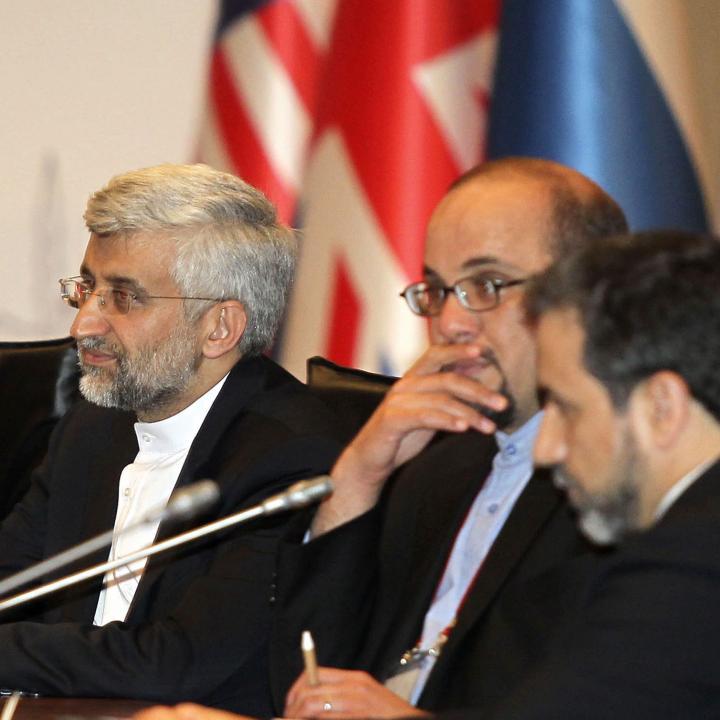

As the United States and its allies increase pressure on Iran, Washington must remain steadfast in its demands rather than respond to Tehran's obstinacy with increasingly generous offers.
Few of President Obama's original foreign policy goals have eluded him so much as engagement with Iran. Over the weekend, Vice President Joseph R. Biden Jr. announced during a speech in Munich that the United States was ready for direct talks with Iran. With the risk of war over Iran's nuclear program looming, the offer is prudent, but it is also beside the point. As Iran continues to evade negotiations -- literally in this case, since the Iranian foreign minister was in the same building as Mr. Biden -- the real question is not whether America should talk to Iran, but how to get the Iranians to talk to us in earnest.
Diplomatic engagement with Iran isn't a new idea. Every American president from Jimmy Carter on has reached out to Iran. But such approaches have never led to improved relations. That was true of the secret visit by President Ronald Reagan's national security adviser, Robert C. McFarlane, to Tehran in 1986 in what became the Iran-Contra affair; it was also true of quiet talks over Afghanistan and Iraq in the 2000s, when the former achieved only fleeting tactical progress and the latter none at all.
The reasons for failure in all the approaches share a common thread: Iran shrank from any broad bilateral thaw because it feared engagement with the United States more than it feared confrontation.
"Resistance" to the West -- and especially to the United States -- was a founding principle of Iran's Islamic regime. And while Iran has gradually normalized relations with many European and Asian allies of Washington, it has not done so with the United States itself, just as it has not with America's ally Israel. To lose those two nations as enemies would be to undermine one of the regime's ideological raisons d'etre.
As a result, serious engagement with the United States is likely to be only a consequence of a strategic shift by the regime, rather than a cause of it. And so far, no such shift has taken place. While there are signs of increasing dissent within the Iranian government as sanctions begin to bite more deeply, there are also indications that existing sanctions have done all they can in this regard: Iran's oil exports are ticking upward after a long decline, and high inflation and unemployment have not produced mass unrest. This provides a good reason for America to offer direct talks -- to counter Iran's narrative of "resistance." But there is little hope that Iran will accept this offer, or that talks right now would be productive.
In fact, the regime may feel that time is on its side. American and Israeli red lines for military action depend on the pace of Iran's nuclear activities, meaning that Iran can delay conflict simply by slowing those activities, as it recently has done. Meanwhile, Iran's leaders may be hoping that black-market workarounds and a pickup in global oil demand will allow their country to expand its exports.
So the United States must be more creative in the ways it uses engagement and pressure to hasten a change in Iran's strategic outlook. On the diplomatic front, America has made clear that it is ready to meet bilaterally whenever Iran is ready to do so; such talks should be a complement -- not an alternative -- to the current multilateral talks, which also include Russia, Britain, France, China and Germany. But the bilateral talks would have to deal not just with the nuclear issue; they should also address the full spectrum of American concerns, including Iran's support for terrorist groups.
Since America's partners in the international negotiations are eager to see direct American-Iranian discussions, and to avoid the military confrontation that could accompany diplomacy's failure, the United States should also insist that the others toughen their own approaches to Iran's government, in hopes of strengthening the hands of those within Iran who argue for a course change.
These other countries should better enforce existing economic sanctions, and employ other available levers of pressure. They should warn Iran that they would support American military action if necessary and that they are prepared to treat Iran and its envoys as pariahs. In addition, they should support Iranian dissidents and counter Iranian activities abroad, for example by following America's lead in designating Hezbollah as a terrorist group and addressing Iranian arms smuggling to Gaza.
As the United States and its allies increase pressure on Iran, it is vital that the Americans remain steadfast in their demands, rather than respond to Iranian obstinacy with increasingly generous offers. If Tehran believes it can wait out pressure or escape it via a narrow technical accord rather than a more fundamental reorientation, it will surely do so.
As the possibility of conflict looms larger and talks drag on, the United States and its allies should worry less about who is on their side of the negotiating table, and more about ensuring that whoever is on the Iranian side actually comes ready to bargain. Otherwise, any American-Iranian talks will not be a diplomatic breakthrough; they will just be another way station on the route to war.
Michael Singh is managing director of The Washington Institute and former senior director for Middle East affairs at the National Security Council.
New York Times



